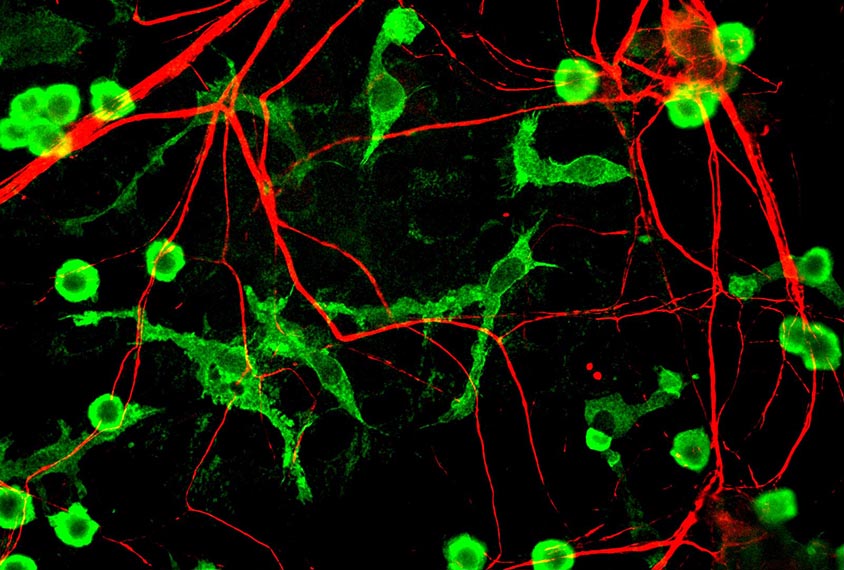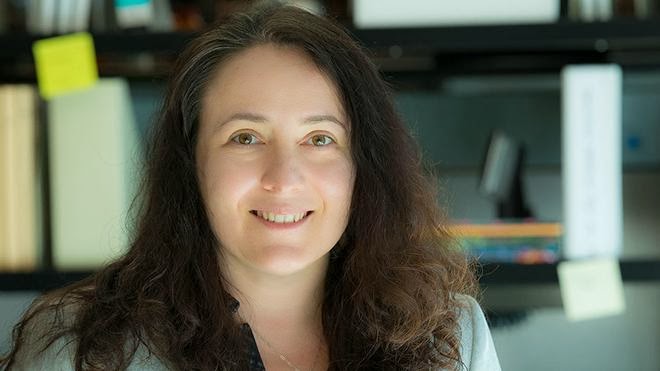
Greek scientist wins Barancik Prize for innovation in Multiple Sclerosis research
Katerina Akassoglou, Ph.D., a leading researcher at the Gladstone Institutes and the Department of Neurology at the University of California, San Francisco, is the winner of the 2018 Barancik Prize for Innovation in Multiple Sclerosis (MS) Research, which will receive and deliver the Prize lecture at the ACTRIMS Forum in Dallas, USA.
Prof. Akassoglou has led a series of studies to uncover the role of a blood-clotting protein called fibrin, which “leaks” from the damaged blood-brain barrier and gets deposited in MS brain lesions. Her team showed that fibrin deposits hinder natural nervous system repair and can activate immune cells in the brain known as microglia, triggering inflammation and nerve damage. Using an antibody that inhibits fibrin, her team has been able to decrease the activation of microglia, and reduce subsequent damage to nerve fibers in mice.
“I study how leakage of blood damages the brain. Our findings shed new light on mechanisms of brain damage in MS, and introduced novel imaging technologies to study the interactions between the brain, immune system, and the vasculature. Translating findings into treatments is a cornerstone of our research program, and we are committed to developing new therapies for MS”, said Akassoglou. She is now developing experimental therapies designed to prevent fibrin from causing damage without affecting its usefulness in blood clotting.
She is also co-founder of the biotech company MedaRed, Inc., which recently received research funding from the National MS Society through its Fast Forward program to further develop and “humanize” an antibody that targets fibrin, to make it more similar to human antibodies and more suitable for use as a potential therapeutic strategy in people with MS. Targeting fibrin has the potential to protect the nervous system in both early and late phases of MS, of particular importance to people living with MS disability and progression.
The Barancik Prize seeks to recognize and encourage exceptional innovation and originality in scientific research relevant to multiple sclerosis, with emphasis on impact and potential of the research to lead to pathways for the treatment and cure for MS, and scientific accomplishments that merit recognition as a future leader in MS research.
Prof. Akassoglou earned a doctorate in neuroimmunology from the University of Athens, Greece, trained in neuropathology at the University of Vienna and did postdoctoral work at The Rockefeller University and New York University. Her awards are numerous, including 2007 Presidential Early Career Award for Scientists and Engineers, the John J. Abel Award in Pharmacology, a EUREKA R01, and the NINDS R35 Research Program Award. She has been at the forefront of efforts to facilitate the work of women in MS research.













Polyxeni Giogiou
-17/08/2019 10:39 pm
Μπράβο σας! Συγχαρητήρια, και εις ανώτερα! Έχω μια κόρη, 31 ετών, που πάσχει 10 χρόνια από M. S. Με ενδιαφέρει άμεσα η ερευνητική δουλειά σας. Θα προσεύχομαι να έχετε δύναμη και φώτιση. Σας ευχαριστώ πολύ.
Michele Medley
-29/07/2020 9:41 am
I was diagnosed with multiple sclerosis in 2014 but had my first symptoms in 2012. both my legs were spasming mostly at night which made sleeping difficult. I tried Copaxone for about 5 years or so. The Copaxone causes joint pain, I have tried several types of medications but all made me sick. In 2019 I went to a care facility, life was too difficult at home for my husband and family. I was advised by one of the nurse at the care facility to try natural treatments, She introduced me to Mayaka Herbal Clinic, spoke to my husband about it and he went online to research, My husband read positive reviews from other people who used the product from Mayaka Clinic, We decided to start me on the treatment. Its been 7 months since I completed the treatment, It has made a tremendous difference for me. all my symptoms including poor vision, pain, fatigue, and other symptoms stopped Visit their website ww w . mayakaherbalclinic .com